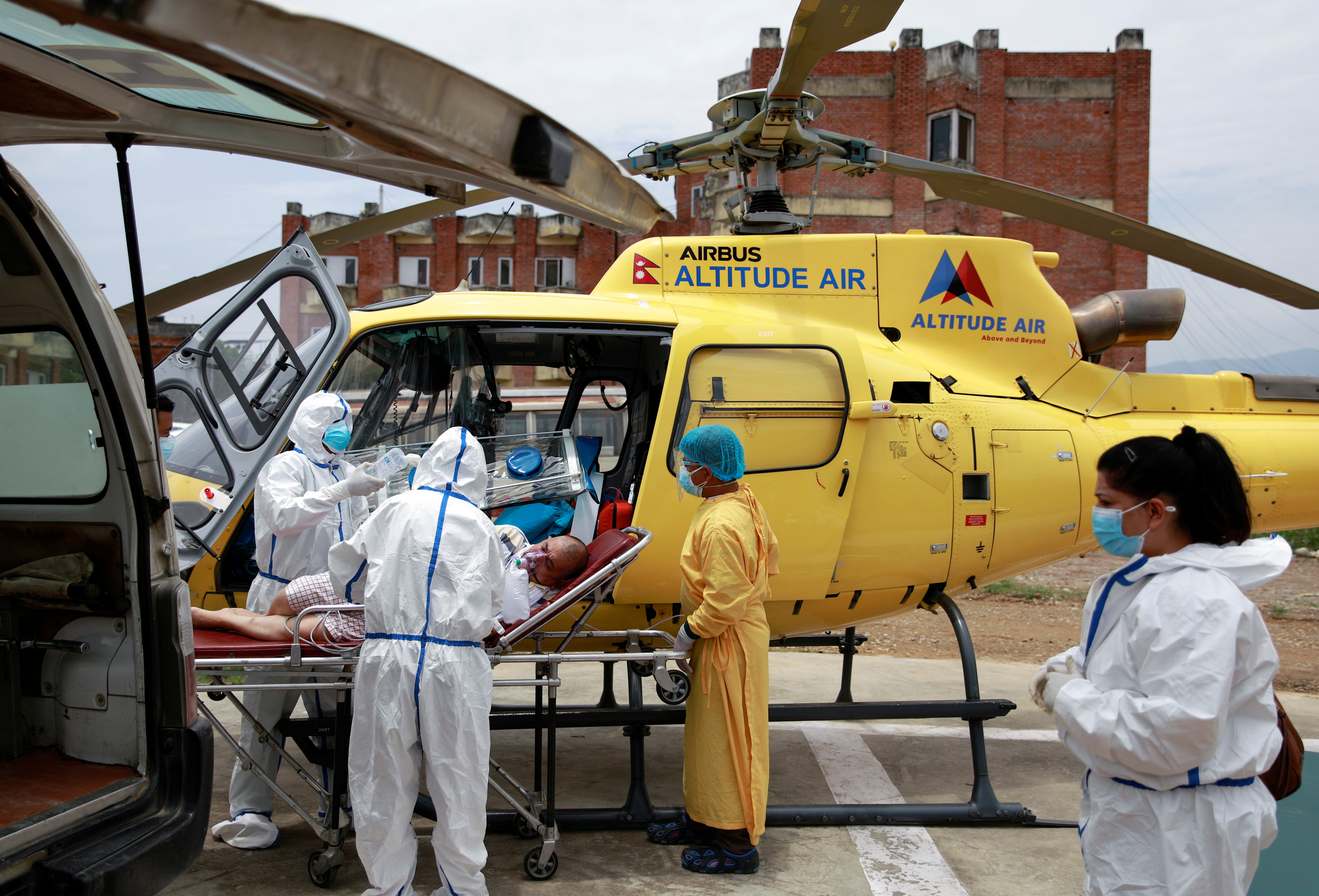Is there a Nepal variant of Covid?
A new mutation of the so-called India variant has been detected in the UK, expert says
Your support helps us to tell the story
From reproductive rights to climate change to Big Tech, The Independent is on the ground when the story is developing. Whether it's investigating the financials of Elon Musk's pro-Trump PAC or producing our latest documentary, 'The A Word', which shines a light on the American women fighting for reproductive rights, we know how important it is to parse out the facts from the messaging.
At such a critical moment in US history, we need reporters on the ground. Your donation allows us to keep sending journalists to speak to both sides of the story.
The Independent is trusted by Americans across the entire political spectrum. And unlike many other quality news outlets, we choose not to lock Americans out of our reporting and analysis with paywalls. We believe quality journalism should be available to everyone, paid for by those who can afford it.
Your support makes all the difference.A new mutation of the so-called Indian coronavirus variant has been detected in the UK, the government has confirmed.
Public Health England (PHE) is investigating both the Indian variant, known as Delta, and the mutation, which is believed to have originated in Nepal.
Scientists are hoping to “better understand whether it could be more transmissible and less effectively tackled by vaccines”, it said.
On Thursday, transport secretary Grant Shapps said rising cases and a new coronavirus mutation were behind the news that Portugal will be removed from the green travel list and added to the amber list.
“I want to be straight with people, it’s actually a difficult decision to make, but in the end we’ve seen two things really which caused concern,” he said.
“One is the positivity rate has nearly doubled since the last review in Portugal and the other is there’s a sort of Nepal mutation of the so-called Indian variant which has been detected and we just don’t know the potential for that to be vaccine-defeating mutation and simply don’t want to take the risk as we come up to 21 June and the review of the fourth stage of the unlock.”

It is thought the new strain is a version of the Indian variant which has acquired new mutations.
A PHE spokesperson said: “[The] ‘Nepal’ variant is Delta with a K417N mutation.”
Dr Jeff Barrett, director of the Covid-19 Genomics Initiative at the Wellcome Sanger Institute, said scientists had observed 91 sequences of the Indian variant with a K417N mutation so far and that that distinction was also present in the strain of Covid-19 first detected in South Africa.
He said: “This mutation is present in [the South African-origin variant] and is believed to be part of why that variant is less well neutralised by vaccines. Because of this possibility, and because Delta appears more transmissible than Beta, scientists are monitoring it carefully.
“This Delta+K417N has been seen in numerous countries, including the UK, Portugal, the USA, and India. It has also been observed once in Nepal, which does very little sequencing, and 14 times in Japan, of which 13 are samples from airport quarantine from travellers from Nepal.”
Previously it had been reported that evidence of a new variant originating from the Himalayan South Asian nation was so far lacking.
On Thursday morning, the World Health Organisation said it was “not aware of any new variant of SARS-CoV-2 being detected in Nepal”.
“The confirmed variants in circulation are: Alpha (B.1.1.7), Delta (B.1.617.2) and Kappa (B.1.617.1). The predominant variant currently in circulation in Nepal is Delta (B.1.617.2),” the WHO said, referring to three mutations – one linked to Kent, two to India – by their new Greek alphabet titles.
Professor Peter Openshaw of Imperial College London, who is also a member of the government’s Nervtag group, told The Independent earlier that there had been talk of a possible new variant from Nepal since last week but so far nothing to back that up in genomic sequencing databases.
“Inevitably the virus is going to continue to evolve and in remote parts of the world where we have little access to samples or data it will be difficult to get information in the early stages of a variant evolving,” he said.
“This really just emphasises how vital it is to get vaccines rolled out as soon as possible and as widely around the world as we can.”
A spokesperson for Nepal’s Ministry of Health and Population said: “So far, no new variant has been detected. We have confirmed three variants only.”
Many variants of Sars-CoV-2 – the virus that causes Covid-19 – have been identified around the world.
They include B.1.1.7, known in the UK as the Kent variant and around the world as the UK variant – but now labelled by the WHO as Alpha.
The B.1.617.2 variant, often known as the Indian variant, has been labelled Delta, while B.1.351, often referred to as the South African variant, has been named Beta.
The B.1.617.1 variant, also linked to India, has been designated as Kappa while the P.1 Brazilian variant has been labelled Gamma.
Nepal is currently battling a surge in Covid-19 cases with the Himalayan nation neighbouring India, which is facing a deadly second wave.

Join our commenting forum
Join thought-provoking conversations, follow other Independent readers and see their replies
Comments